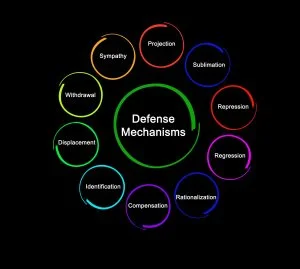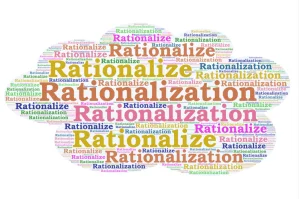Defense mechanisms are mental, emotional, or physical actions that protect us from feeling or expressing unwanted feelings. These defenses may be healthy and adaptive but also maladaptive at times. If they lead to excessive denial, repression, projection, etc. It’s important to know what your defense mechanisms are and how they affect you in order to make the best decisions.
Contents
- 1 What Are Defense Mechanisms?
- 2 Some Common Defense Mechanisms
- 3 Healthy Defense Mechanism
- 4 Unhealthy Defense Mechanisms
- 5 How To Deal With Harmful Defense Mechanisms?
- 6 Defense Mechanism Test
- 7 What If Your Defenses Are Harming Someone?
- 8 How To Keep Track Of Your Defenses?
- 9 Conclusion
- 10 A Word From Therapy Mantra
What Are Defense Mechanisms?
 Defense mechanisms are psychological strategies that we use to protect ourselves from anxiety-provoking thoughts, feelings, or memories. They can be very helpful in minimizing distress. But they can also get in the way of our relationships and interfere with our ability to achieve our goals. Some common defense mechanisms include denial, repression, projection, and dissociation.
Defense mechanisms are psychological strategies that we use to protect ourselves from anxiety-provoking thoughts, feelings, or memories. They can be very helpful in minimizing distress. But they can also get in the way of our relationships and interfere with our ability to achieve our goals. Some common defense mechanisms include denial, repression, projection, and dissociation.
Defense mechanisms are generally classified as “healthy” or “unhealthy” depending on whether they meet the four following criteria:
- Whether they help to avoid conflict and shame
- Whether they help to achieve goals
- How much reality they distort
- The extent to which they damage interpersonal relationships and hinder psychological growth
Some Common Defense Mechanisms
There are many different types of defense mechanisms, but some of the most common ones are denial, rationalization, and projection. Denial is when you refuse to believe a fact even though the evidence is staring you in the face. Rationalization is when you try to explain away unacceptable behavior or thoughts. And projection is when you attribute your own unacceptable thoughts, feelings, or impulses to other people.
Some other types of defense mechanisms are
- Displacement
- Reaction formation
- Repression/suppression
- Undoing
- Identification with the aggressor
- Passive-aggressive behavior
- Self-handicapping
- Intellectualization
- Sublimation
Defense mechanisms are a way for us to protect ourselves from uncomfortable thoughts or feelings that may come up in life.
I believe that the best defense mechanism is to be open and honest with people. I think that if you can share what’s going on inside of your head with somebody, you’re less likely to subject yourself to unhealthy amounts of stress in order to keep it bottled up.
Healthy Defense Mechanism

A healthy defense mechanism is one that allows you to protect yourself without causing harm to your relationships with others. It is based on reality, and it helps you to cope with difficult situations in a healthy way. One example of a healthy defense mechanism is displacement. It is when you redirect your feelings or impulses onto someone or something else. For example, if you are angry at your boss but can’t express those feelings because it would be inappropriate. You might take out your anger on your partner instead.
An example of a healthy defense mechanism might be that of humor. When you are feeling attacked by someone, laughing at their attempt to hurt you can help you avoid conflict and shame. It may also elevate your status over the person who has attacked you. However, it does not distort reality very much, nor does it damage interpersonal relationships. An example of an unhealthy defense mechanism might be that of self-handicapping, where you purposely sabotage your efforts so that you can’t fail or succeed.
Unhealthy Defense Mechanisms
There are many common unhealthy defense mechanisms and below we will briefly discuss some of them:
Projection
When people are projecting, they are attributing their own unacceptable thoughts, feelings, or impulses to other people. For example, someone who is angry at his mother might accuse her of being an alcoholic without any evidence for this claim.
Projection becomes unhealthy when you blame the wrong person. Projection can also cause us to have unrealistic expectations. Because we perceive other people to be more evil or selfish than they actually are.
Denial
When you use denial, you refuse to believe a fact even though the evidence is staring you in the face. One example might be someone who becomes angry with a friend for canceling plans but does not admit that she was hurt by her friend’s change of plans. This is different from lying because, in order to lie, you have to know the truth about what happened.
Denial can become unhealthy when you are in denial for too long. Or if someone else has to make you face reality or admit an obvious truth about your beliefs or behavior. For example, it would be unhealthy for a husband to deny for a long time that he is having an affair. Denial and rationalization become unhealthy when you use them to fix problems in your life for too long. Or when you try to convince yourself that another person’s harmful or hurtful behavior was OK.
Rationalization

Another type of defense mechanism is rationalization, which involves explaining away unacceptable behavior or thoughts. For example, someone might have gotten into a big fight right before going to a dinner party. So they go even though they haven’t patched things up with their friend yet. They might tell themselves that the friend will probably not even notice if they don’t say anything to him all night. Rather than admit that they are having fun with their friends and enjoying the dinner party.
Rationalization is mostly associated with justifications for our own behavior or actions such as blaming external factors for mistakes. But it can also involve justifying the behavior or actions of others. For example, we might tell ourselves that our friends would not be acting like they were if they did not have good intentions. Even though it is clear to us that their rude behavior could harm someone else.
Projection, denial, and rationalization are three very common types of unhealthy defense mechanisms. The next time you find yourself feeling uncomfortable about your own thoughts or behaviors, take a step back and see if you can identify the underlying reason for your feelings. Are you projecting? Denying? Making excuses for yourself or someone else? These are all warning signs that your defense mechanisms are becoming unhealthy.
How To Deal With Harmful Defense Mechanisms?

If you find that you are using defense mechanisms that are harmful, such as denial, rationalization, or projection, there are a few things you can do to deal with them.
- First, it’s important to be aware of what you’re doing and why. Once you have identified the defense mechanism you are using, you might want to make a concerted effort to stop.
- You can also try talking to someone close about what’s going on inside your head or you can talk with a therapist. Sometimes, it’s hard to break the habit of using defense mechanisms, so it may be helpful for you to tell yourself that you are allowed to use them at times, but not all the time.
- If denied long enough, these feelings build up and cause serious problems in relationships – romantic, family, friendship, etc. If confronted on the subject people who do this will say they don’t know what you’re talking about or just blow you off completely rather than face the issue & work through it together.
Talk To Someone
If you find that your defense mechanisms are having a negative impact on your life, it might be helpful for you to talk about the subject with somebody else. The next time somebody close to you calls you out on something or confronts you about how your behavior is affecting them, try being honest with them rather than getting defensive. A good thing to do would be to identify your defense mechanism and explain why it’s beneficial for you in this situation. As long as the other person has opened up with you about their feelings, it should not be hard for you to do likewise.
Talking To A Therapist
Another option that may help if high levels of stress have led you to use unhealthy defense mechanisms is talking to a therapist. They can let you know what type of defense mechanisms are common for people in your situation. If you’re not sure where to start, try checking out online reviews or asking around to see if anybody you know has had a good experience with a certain therapist.
Having An Open Relationship With Others

When it comes down to it, the best way to deal with your defenses is open and honest communication with people who are close to you. This reduces stress by letting out feelings that might otherwise build up inside you without getting any release whatsoever. When somebody close tells you what’s going on inside their head, don’t be afraid to do likewise! You’ll find that being open and honest can strengthen relationships rather than tear them apart.
I think that the best defense mechanism is to be open and honest with people. I think that if you can share what’s going on inside of your head with somebody, you’re less likely to subject yourself to unhealthy amounts of stress in order to keep it bottled up. It may be helpful for you to tell yourself that you are allowed to use defense mechanisms at times, but not all the time. Just remember that there is nothing wrong with using them every once in a while, but when they become a habit rather than just a means of coping then it might be time for some self-reflection so as not to let them get the best of you!
Defense Mechanism Test

This test was created by Anna Freud (the daughter of Sigmund Freud) in 1936. It was created with the intent of diagnosing members of her father’s (Sigmund Freud) psychiatric patients. The defense mechanisms were categorized by Anna and Sigmund, and this test reflects their view on how normal behavior is affected by different defense mechanisms.
You can take the defense mechanism test here:
This test is a great way to open up communication with someone. The next time somebody confronts you or calls you out for something that’s bothering them, try taking the defense mechanism test first before getting defensive. This could help keep an argument from getting too out of hand because you’ll know what your usual reaction to confrontation happens to be!
Choose one of the following: Never/Rarely/Sometimes/Often/Always –
Repression: “You tend to ignore upsetting thoughts, feelings, memories, and impulses.” Repression could cause someone to become withdrawn and introverted. It may also cause a general ignorance of one’s emotional state, leading to people getting taken advantage of due to their lack of awareness.
Repression
The Repression Defense Mechanism is when you ignore your own thoughts and emotions.
Intellectualization is the opposite of Repression where you think in ways that avoid issues with a lot of thinking or talking but without feeling or emotion.
Intellectualization is the defense mechanism when you only focus on the facts and less on how you feel about them because it’s too hard to deal with feelings so they are ignored rather than thought about.
For example, when someone dies instead of focusing on their emotions about the death you focus on facts like “They were 92 years old” or “Their funeral will be on Wednesday.”
Intellectualization
Denial: “You tend to refuse to admit that things are as bad as they seem.” Denial could cause someone to ignore problems in their life, even serious ones. If this defense mechanism is being used by a child, it can lead them toward running away from home at an early age. It may also contribute to substance abuse. Since people don’t want to face how badly they need help for their problem.
Denial
The Denial Defense Mechanism is when you ignore your problems and reality.
Reaction Formation: “You don’t feel like taking it out on someone who’s really pissing you off, so you take it out on someone else who has nothing to do with the situation”. This could make a person very hostile towards others even when they aren’t angry (like punching somebody in the face for no reason). It may also cause an excessive need to please people and become excessively emotional.
Reaction Formation
The Reaction Formation Defense Mechanism is when you act the opposite of how you actually feel because it’s too hard or too uncomfortable to express yourself.
Displacement: “Your anger doesn’t have a true target, so you pick on someone who is easier to take it out on.” This could cause verbal abuse toward people who don’t deserve it. It may also cause physical violence, such as throwing books or punching walls because the person isn’t mad at the right person.
Displacement
The Displacement Defense Mechanism is when you express your anger towards something that doesn’t make sense or isn’t the reason why you are really angry about something.
Projection: “You attribute to others traits that actually describe yourself.” Projection could cause a person to accuse other people of having faults when they are in fact seeing their faults in them. For example, if a person is being hypocritical they may think someone else is being hypocritical. It could also cause a lack of accountability as well since the person doesn’t have to take responsibility for their own actions because it’s easier to blame other people instead.
Projection
The Projection Defense Mechanism is when you believe that other people have faults and you are innocent but in reality. It’s actually the exact opposite.
Introjection: “You see yourself as your parents want you to be, not as who you really are”. Introjection could make a person very dependent on others or even become critical towards themselves. This defense mechanism could lead someone to feel inferior and sabotage their own goals. For example, the person could have a dream to sing professionally but then decide they don’t have what it takes even though they really do. Introjection: Never/Rarely/Sometimes/Often/Always
The Introjection Defense Mechanism is when you imitate your parents or other authority figures because you want to be like them or think that is how you are supposed to behave.
What If Your Defenses Are Harming Someone?

If you think your defenses are harming someone else, here are some tips:
1. Consult With A Therapist
Talk to a therapist or counselor about your defenses. They can help you understand why you use them and how they might be harming others.
2. Be Aware Of Your Defenses
Try to be aware of when your defenses are kicking in. Notice what triggers them and try to find healthier ways to cope with those triggers. Make sure that your defenses are not harming yourself as well as others. For example, if you’re constantly withdrawing from relationships, that may be harmful to both you and the people around you. Be honest with yourself and others about how your defenses are affecting them. If someone has expressed concern about how your defenses are harming them, you should take that seriously.
3. Talk
Talk with others about your defenses in a nonjudgmental way. For example, if you are aware of withdrawing from relationships as a defense mechanism. Then be open to talking through how it might be harmful to others. If you recognize that your defenses are hurting yourself or others, try not to beat yourself up over it. Also just make an effort to change your behavior.
4. Find Opportunities
Look for opportunities to practice developing healthier coping skills and forms of communication. For example, if you’re used to withdrawing from social situations when you feel anxious or stressed, look for opportunities where that would work against you (like having difficult conversations). Then think of ways that would work instead (like taking deep breaths or asking for help).
5. Develop Strengths
Try to develop your strengths and resilience so that you have the inner resources to not use these harmful defenses. For example, if you are emotionally sensitive, try to learn coping skills like meditation, mindfulness practices, or lovingkindness (metta) meditation. If you feel overwhelmed by stress in relationships, look for ways to take better care of your own needs; find time alone; do things that give you pleasure; etc.
6. Keep Trying
Above all else, keep trying! Through practice and the cultivation of new habits, it is possible to break old patterns. As one Buddhist nun once told me when I asked her how she meditated for hours every day, sometimes with great difficulty. “This path is a path of joy, but it is a difficult one. It requires a lot of hard work and many disappointments along the way. But there’s nothing else I’d rather be doing.”
By talking to a therapist or counselor, being aware of when they’re kicking in, making sure they’re not harming yourself and others and being honest with yourself and others. You can also try to practice developing healthier coping skills and forms of communication.
How To Keep Track Of Your Defenses?

Keeping track of your own defenses is an important part of managing them. How can you do that? By talking to a therapist or counselor, being aware of when they’re kicking in, making sure they’re not harming yourself and others and being honest with yourself and others. You should also try to practice developing healthier coping skills and forms of communication. If you find that examining the factors that trigger certain defenses is helpful. Then you can also try keeping a journal that tracks your triggers.
Conclusion
I hope you’ve enjoyed this article and learned a few new things about how your brain works. Understanding the defense mechanisms we use to protect ourselves from anxiety, fear, shame, and sadness can help us understand our behaviors more clearly. It is key for building rapport with prospects or customers. I would be happy to answer any questions you may have in the comments section below.
A Word From Therapy Mantra
Your mental health — Your psychological, emotional, and social well-being — has an impact on every aspect of your life. Positive mental health essentially allows you to effectively deal with life’s everyday challenges.
At TherapyMantra, we have a team of therapists who provide affordable online therapy to assist you with issues such as depression, anxiety, stress, workplace Issues, addiction, relationship, OCD, LGBTQ, and PTSD. You can book a free therapy or download our free Android or iOS app.


